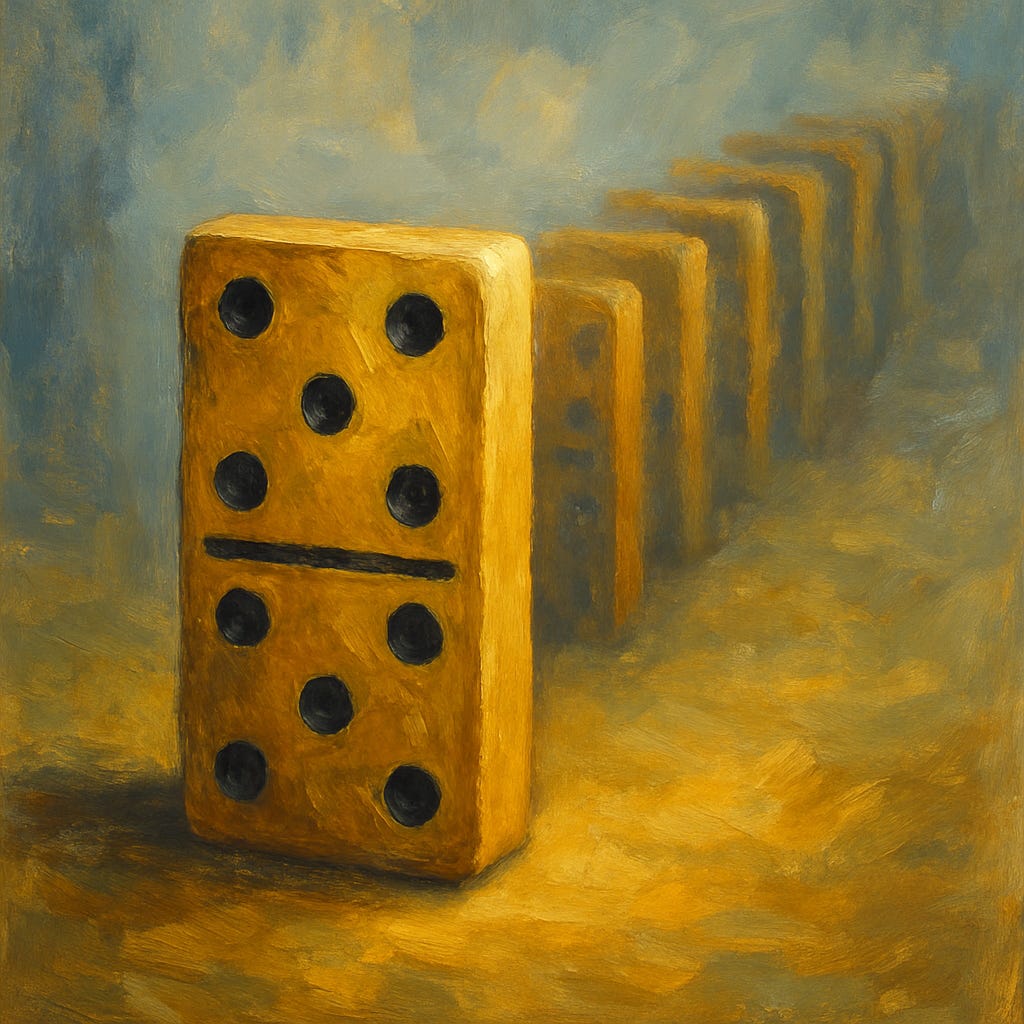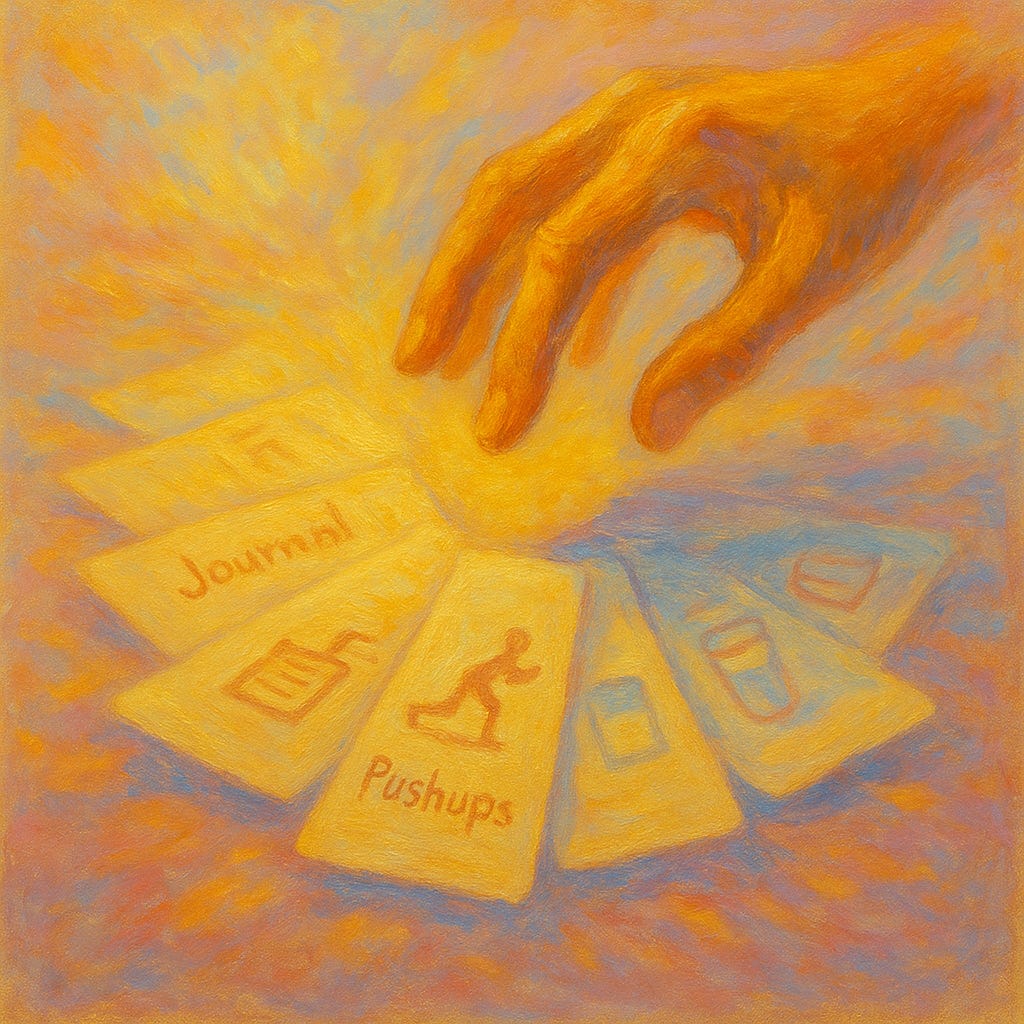Just One Habit: The Baby Step to Lasting Change
Stop trying to fix everything at once. Start with one stupidly simple habit and build from there.
The Problem With How We Try to Change
We’ve been doing this all wrong.
We buy the books. Download the apps. Create elaborate systems. We tell ourselves this time will be different—we’ll overhaul our entire lives in one ambitious sprint.
New morning routine. Better diet. Exercise plan. Productivity system. Meditation practice. Sleep hygiene. All at once.
Then reality hits. We burn out. Feel guilty. And start over with the next system that promises to finally fix us.
Here’s what nobody tells you: The problem isn’t that you picked the wrong system. The problem is trying to change everything simultaneously.
Your brain can’t handle that much change at once. Willpower is finite. Decision fatigue is real. And when you’re trying to build ten new habits, you’re setting yourself up to master none of them.
What if the answer isn’t a better system?
What if it’s just... one habit at a time?
The Power of Starting Stupidly Small
Think about it: Everything starts from something. The universe began with a single moment. Avalanches start with one snowflake. Dominoes fall in sequence, not all at once.
Change works the same way.
You don’t need a complete life transformation. You need one stupidly simple habit that sets everything else in motion—your keystone habit.
For most of us, sustainable change doesn’t come from extreme discipline or complicated systems. It comes from starting so small it almost feels silly.
The habit I recommend you start with? Making your bed. (There is a reason all the coaches are recommending this)
I can hear the skepticism already. “That’s it? Making my bed is going to change my life?”
Not directly. But here’s what it does:
Making your bed is a morning ritual that tells your brain: “I accomplished something today.” It’s proof you can follow through. It’s visible evidence of change. And it takes less than two minutes.
Even if someone is still sleeping in your bed (like my son often is), you can straighten your pillow and adjust the covers on your side. It’s not about perfection—it’s about the act itself.
To remember to do this, put a Post-it note somewhere you’ll see it first thing in the morning. On your bathroom mirror. On your phone. Wherever your eyes go when you wake up.
That’s step one. Just make your bed. Nothing else changes yet.
The 1-2 Punch: Adding Your Second Habit
Once making your bed becomes automatic (usually after a week or two), you’re ready to add the next link in the chain.
Here’s your second habit: Drink a glass of water.
Not a complicated morning smoothie. Not a specific type of water at a specific temperature. Just one glass of water.
Your new sequence: Make bed → Drink water.
Two habits. Both take less than five minutes total. Both are so simple you can’t fail at them.
This is called habit stacking—building new behaviors onto existing ones. Each habit becomes a trigger for the next. Your brain starts to connect them automatically.
After making your bed, your body knows: “Now I drink water.”
This is how you build momentum without overwhelm.
The Notecard Game: Making Habit Building Fun
Here’s where it gets interesting.
Once you have your core two habits locked in (make bed, drink water), you can experiment with a method I call the Notecard Game. It’s designed to make building new habits feel playful rather than overwhelming—especially useful for those of us with ADHD or anyone who gets bored with rigid routines.
Here’s how it works:
Get a stack of notecards
Write one simple action on each card. Keep them stupidly simple:
“Open the blinds”
“Write 2 sentences in a journal”
“Meditate for 1 minute”
“Put away 2 items from the kitchen counter”
“Do 5 pushups”
“Stretch for 2 minutes”
Shuffle the cards face down
Each morning after making your bed and drinking water, draw one card
Do whatever it says
Why this works:
You don’t know what’s coming next, which creates a sense of play and novelty. Your brain loves novelty—it releases dopamine and keeps you engaged. The element of surprise makes the routine feel less like a chore and more like a game.
Over time, some of these random habits might become static parts of your routine. That’s fine. The notecards can evolve into a “daily wildcard”—one unexpected task that keeps things interesting.
Important: Each card should take less than 5 minutes. The goal isn’t to add difficulty—it’s to build the muscle of following through.
Why One Habit at a Time Actually Works
When you focus on one habit, you eliminate decision fatigue. You’re not waking up wondering which of your ten new habits to prioritize. You just make your bed. Then drink water. Done.
Each small win builds confidence. Your brain gets a dopamine hit from completing the task. You’re literally rewiring your neural pathways to associate mornings with accomplishment rather than overwhelm.
Each habit reinforces the others. The chain becomes stronger with each link. Miss a day? The other habits are still there, holding the structure in place.
This is how lasting change happens—not through dramatic overhauls, but through small, consistent actions that compound over time.
The Internal Battle: When You Don’t Believe You Can
Here’s the hardest obstacle: You don’t believe you can actually change.
This belief alone can destroy your progress before you even start. We get in our own way more than any external obstacle ever could.
The negative voice in your head—the one that says “I can’t” or “I always fail at this”—feels powerful. But here’s the truth: It’s just thoughts. Even Marcus Aurelius, one of history’s greatest Roman Emperors and Stoic philosophers, struggled with self-doubt.
He didn’t ignore that inner voice, but he didn’t let it control him either. He acknowledged it and moved forward anyway.
Marcus Aurelius wrote: “You have power over your mind—not outside events. Realize this, and you will find strength.”
He understood that the obstacle isn’t the external circumstance—it’s how we judge it. The story we tell ourselves about what’s possible.
When you hear “I can’t,” try this reframe:
Replace “I can’t” with “This is the perfect chance to practice.”
That mental shift turns obstacles into training grounds. Every moment of doubt becomes an opportunity to prove your old story wrong.
A Simple Stoic Reframe
When the doubt shows up:
Name it: “This is just my mind creating noise. It’s not truth—it’s habit.”
Reframe it: “Every obstacle is practice. This is fuel for discipline.”
Act anyway: “What matters is moving forward in this moment. I choose to act.”
Pocket mantra when doubt hits: “This is practice. I move forward.”
Or, channeling Marcus Aurelius: “The obstacle is the way. My work is to act.”
A Real Example: My Sleep Habit
I’m practicing what I teach. This month, my one focus habit is sleep hygiene.
Not a complete life overhaul. Not ten new habits. Just better sleep.
Here’s what that looks like:
Around 9 PM, I start dimming the lights throughout my home. Instead of watching TV before bed, I’m switching to reading with lamp light. I drink chamomile and valerian root tea as part of my wind-down ritual.
Everything else in my life continues as normal, but it’s all being structured to support this one habit: getting better sleep.
Why sleep? Because it’s foundational. Better sleep gives me more energy. More energy makes everything else—creating content, being present with my son, building my business—easier.
Once I’ve mastered this habit over the next 30 days, I’ll add the next one using the same process.
One habit. 30 days. Then the next.
That’s how you build a life that actually works.
Your Turn: Start Tomorrow
Here’s what I want you to do:
Tomorrow morning, make your bed. That’s it. Don’t add anything else yet. Just that one tiny action.
Do it again the next day. And the next.
Once it feels automatic—usually after a week or two—add one glass of water right after making your bed.
Make bed → Drink water. Your 1-2 punch.
Commit to 30 days of just these two habits. Track them on a calendar. Put a checkmark for each day you do both.
After 30 days, you’ll have proof that you can follow through. You’ll have built momentum. And you’ll be ready to add the next habit to your chain.
Don’t try to fix everything at once. Just start with one stupidly simple habit and build from there.
The life you want isn’t built in one dramatic transformation. It’s built one small, consistent choice at a time.
What’s the one habit you’re starting with tomorrow?
Troubleshooting: What Can Derail Your Habit (And How to Fix It)
If you want to go deeper on potential obstacles, here are the most common pitfalls and their solutions:
1. Starting Too Big
The mistake: “I’m going to meditate for 30 minutes every morning.”
Why it fails: A 30-minute commitment collapses under its own weight, especially when you’re building a new habit.
The fix: Start with 1-2 minutes. Once it’s automatic (several weeks in), then expand.
2. Unclear Triggers
The mistake: “I’ll work out sometime today.”
Why it fails: Your brain doesn’t know when to act. Without a precise cue, the habit never becomes automatic.
The fix: Tie your habit to something concrete. “After I make my bed, I’ll drink one glass of water.” Specific triggers create automatic behaviors.
3. Relying on Motivation
The mistake: Waiting until you “feel like” doing it.
Why it fails: Motivation is unreliable. You won’t always feel like making your bed or drinking water or doing anything, really.
The fix: Build habits into your environment. Post-it notes. Phone alarms. Physical placement—like packing your gym bag the night before and leaving it by the front door. Make the right choice the easy choice.
4. Not Tracking Progress
The mistake: No visible record of your consistency.
Why it fails: Without seeing your progress, your brain doesn’t get rewarded.
The fix: Use a simple system. A paper calendar with checkmarks. An app. Even just checking off a box on a list. The key is making your progress visible and celebrating each small win.
5. All-or-Nothing Thinking
The mistake: “I missed one day, so I failed. Might as well quit.”
Why it fails: Life happens. One missed day doesn’t erase all your progress.
The fix: Missing a day means nothing. What matters is getting back to it the next day. The only real failure is giving up entirely.
6. Your Environment Works Against You
The mistake: Junk food in sight. TV remote within reach. Your environment creates friction against good habits.
Why it fails: Willpower is limited. If your environment fights you, you’ll lose eventually.
The fix: Design your space to make better choices easier. Put healthy snacks at eye level. Hide the remote. Place your running shoes by the bed.
7. Waiting for the Big Payoff
The mistake: Expecting immediate, dramatic results.
Why it fails: New habits often pay off much later, while bad habits provide instant gratification.
The fix: Create instant rewards. Check a box. Tell yourself “Yes, I did it.” Celebrate the small wins immediately, even if the big results take time.







Quick question for everyone:
What ONE habit would make the biggest difference in your life if you mastered it this month?
For me it's sleep hygiene - everything else gets easier when I'm well-rested.
Curious what others are working on 👇